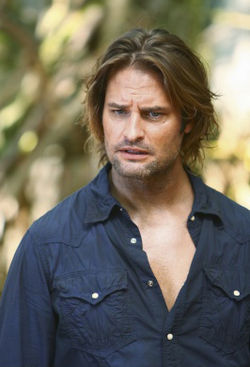I wonder …
Could the ending be a long con by Damon Lindelof and Carlton Cuse, something they dreamed up in order to see if they could get away with it?
Think about it. Six years of dazzlingly smart, complex story-telling, raising questions of free will versus destiny, science versus faith, and good versus evil, weaving themes about the betrayal of children by their parents, creating characters with “special” powers, building a world with a system of mysterious rules that keeps even the most powerful in check, seeding easter eggs and cross-references so complex that thousands of blogs and websites and the amazing Lostpedia had to be created to keep track of them all … and then it all boils down, in the words of my blog-pal Val, to “they died happily ever after”?
No way.
Yes, I’m being tongue-in-cheek. But I really can’t imagine how they came up with such an ending. It was so jarring, so disconnected from anything that had come before.
What do you think? Do you agree? Disagree? Do you think the ending fit in with what had come before? If so, why? If not, did it bother you or did you enjoy it the way it was?
Editing to add: Demonstrating once again that there are no new ideas, after posting this, I did a vanity search on Twitter for “LOST long con,” and I found that a whole lot of people had already been tossing that idea around long before I thought of it. That search, though, fortuitously led me to an article which is the best I’ve read so far on the finale: Lost was the ultimate long con by Charlie Jane Anders.











I loved the ending, so I think the only con was the fans who kept watching for six seasons expecting they were going to get answers to the mythology, when the show has never really been about that. The finale was all about character resolution, which is what the show has always been about.
I love the pic you’ve got to go with the episode…heh…the writers did say that Sawyer was one of their favorite characters.
I was saying to my husband that the secrecy required to keep big finales like this from leaking out requires that the writers work in isolation. Once you’ve been alone with your material for 6 years, you lose any sense of objectivity. I think if some outside people had been allowed to view the finale and go WTF? about all the loose ends that had been created in the intervening seasons, they might have been able to craft a finale that made everyone happy, not just those looking for a spiritual ending.
Of course I can’t help thinking that they’re having a good laugh about all the people who’re reading so much into the ending they did write.
Keith, I’ve always been more interested in the characters than in the mythology. Still, as Chekov said, if you show a gun hanging on the wall in Act I, you better have someone firing it by Act III.
Val, that’s a very interesting point about the writers not having the outside feedback that might have allowed them to course-correct. Wow. That may explain a lot!
P.S. The picture of Sawyer is from Wikipedia, I think from an old episode. Nice, huh? You can click on it to see the original.
I, for one, am wondering the same thing. It’s not that I expected answers to all the questions raised in the mythology. Some of the great battles & issues have no clear answers, so that would have utterly failed.
But I completely agree with you in that the great things that I loved about the show – powerful writing, plot twists, unexpected connections – were absent.
It was just ok. For this show, that’s a terrible grade, because after most episodes, I would have rated the show fantastic. Lost went from innovative to cop-out in just 180 minutes.
I knew I’d feel empty when it ended. I just wish I felt fulfilled first.
Ms Terri, we were way, way, *way* past Act III, and the writers have been dropping fire-and-forget mysteries since the start of Act I.
I can understand that Chekov might not have made it far enough into LOST to watch the finale, but clearly a lot of fans did. Why they hung on through Seasons 5 & 6, if it wasn’t for the character development, is beyond me.
Steve — “from innovative to cop-out in just 180 minutes.” Yeah, exactly. I’m starting to wonder if there might have been some pressure from the studio to come up with a conventional ending. I guess that’s a long-shot, but I just can’t imagine why the writers came up with something that was so out of tune with the rest of the show.
Keith, I was always in it for the character development. But I thought the ending cheated us on that.
For example, when Jack, in the sideways world, had a breakthrough with his son, that provided a resolution to the 6-year story arc of Jack’s problems with his father. By becoming the father that his own father never could be, Jack resolved his own Daddy issues.
That was a resolution that was earned, that Jack created for himself by his choices.
And then Locke told him that he really had no son. Oh, well. It was only a dream, of sorts. That totally undercut the dramatic resolution we had experienced.
Compare that with dead Christian Shephard popping up in the church and putting his hand on Jack’s shoulder. That was an unearned resolution. It was a writerly contrivance. It didn’t (as far as I can see) come out of anything that Jack did. It just happened. There’s no character development when things just happen, as opposed to being the result of something that the characters do or choose.
I don’t see it that way at all. Jack had the breakthrough with his daddy issues and came to terms with himself. This realization doesn’t simply dissapear after learning that he never had a son. The bottom line was that he walked a mile in his Dad’s shoes and saw how a kid reacts to an aloof and demanding father.
It’s a moot point, regardless. If this finale has taught me anything, it’s that everyone (including myself) is interpreting the finale completely differently. So it goes. I guess I shouldn’t be surprised given the elaborate theories we’ve constantly spun since the pilot episode.
To me, the breakthrough is undercut by the situation not being real. That’s what gives it the “it was all a dream” quality, IMO. Dorothy learned a lot of important lessons when she dreamed she was in Oz, and 70 years ago, that might have been a good ending, but now, I think, it’s become trite.
Just my opinion, and obviously opinions differ greatly. If you look at the polls, here and on other sites, it looks like people split almost 50/50 on whether they liked or didn’t like the finale.
Although, arguably, Darlton couldn’t have pleased everyone, I would have thought they could have come up with something — some other ending — that might have pleased more than half.
It seems to me the whole alternate reality was shoehorned in so they had a mystery they could answer at the finale since they couldnt come up with a complete solution everything else.
Interesting! Sounds very plausible.
Finally got around to watching the last episode. I had been holding off. I was wrapped with how season 6 was unfolding and there were some fantastic episodes to exaplain Richard, Jacob and his brother etc and it was all starting to make sense. The final episode was going along fine, and then….wham – a church and they are all dead and going to heaven. WTF ? What an absolute load of dog shite. That has to be the most cliched and anti-climactic ending to great series ever in history. Was it written by a 14 year old ? Great show, brilliant – but almost completely undone by a lame and nonsensical ending. If they are all dead why was Penny there? She was not in the plane crash. Either was Miles. What about the faked crash and the first time they came back? What about Ben? He was already on the island. They clearly made it up as they went and had no way to tie it together and just went the easy “it was all a dream” cliche. Grabage.
Yeah, that sums it up nicely — a great show with the most anti-climactic ending ever.
P.S. As painful as the ending was, they didn’t actually go as far as to say it was ALL a dream — just that the Season 6 flashsideways events were.
As one of the few people who totally LOVED the flashsideways stories, I thought it was bad enough that THOSE turned out to be a dream (or a pre-death test? or a mass hallucination? or a spiritual journey? or — a what? — that’s one of the things that bugged me the most, that they created these fascinating alternate lives, then said they never happened, but never explained what they were and why they were put into the story) — but the Island stuff did actually happen. The LOST-ies did survive the plane crash. All the stuff we saw in the show (except for the flashsideways) did really happen.
(Just mentioning this because it wasn’t clear from your comment if you realized that.)